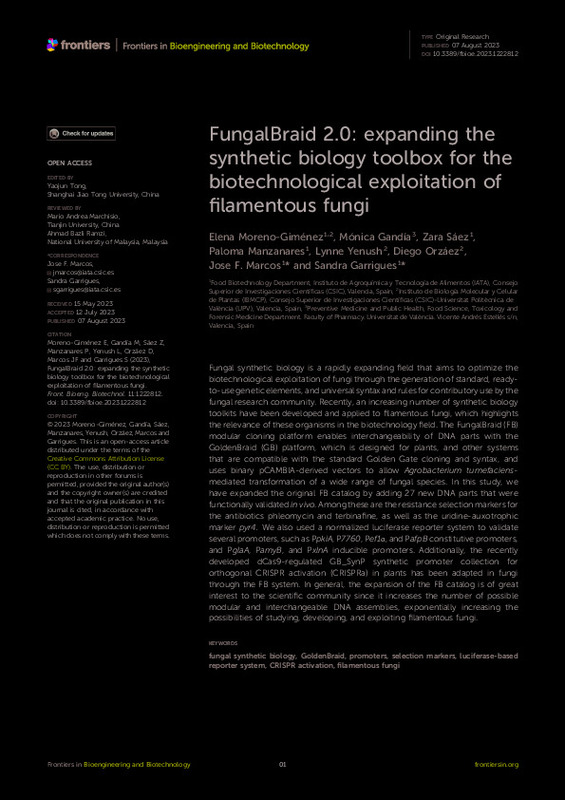JavaScript is disabled for your browser. Some features of this site may not work without it.
Buscar en RiuNet
Listar
Mi cuenta
Estadísticas
Ayuda RiuNet
Admin. UPV
FungalBraid 2.0: expanding the synthetic biology toolbox for the biotechnological exploitation of filamentous fungi
Mostrar el registro sencillo del ítem
Ficheros en el ítem
| dc.contributor.author | Moreno-Giménez, Elena
|
es_ES |
| dc.contributor.author | Gandía, Mónica
|
es_ES |
| dc.contributor.author | Sáez, Zara
|
es_ES |
| dc.contributor.author | Manzanares, Paloma
|
es_ES |
| dc.contributor.author | Yenush, Lynne
|
es_ES |
| dc.contributor.author | Orzáez Calatayud, Diego Vicente
|
es_ES |
| dc.contributor.author | Marcos, Jose F.
|
es_ES |
| dc.contributor.author | Garrigues, Sandra
|
es_ES |
| dc.date.accessioned | 2024-01-08T19:03:09Z | |
| dc.date.available | 2024-01-08T19:03:09Z | |
| dc.date.issued | 2023-08-07 | es_ES |
| dc.identifier.uri | http://hdl.handle.net/10251/201626 | |
| dc.description.abstract | [EN] Fungal synthetic biology is a rapidly expanding field that aims to optimize the biotechnological exploitation of fungi through the generation of standard, readyto-use genetic elements, and universal syntax and rules for contributory use by the fungal research community. Recently, an increasing number of synthetic biology toolkits have been developed and applied to filamentous fungi, which highlights the relevance of these organisms in the biotechnology field. The FungalBraid (FB) modular cloning platform enables interchangeability of DNA parts with the GoldenBraid (GB) platform, which is designed for plants, and other systems that are compatible with the standard Golden Gate cloning and syntax, and uses binary pCAMBIA-derived vectors to allow Agrobacterium tumefaciensmediated transformation of a wide range of fungal species. In this study, we have expanded the original FB catalog by adding 27 new DNA parts that were functionally validated in vivo. Among these are the resistance selection markers for the antibiotics phleomycin and terbinafine, as well as the uridine-auxotrophic marker pyr4. We also used a normalized luciferase reporter system to validate several promoters, such as PpkiA,P7760,Pef1¿, and PafpB constitutive promoters, and PglaA,PamyB, and PxlnA inducible promoters. Additionally, the recently developed dCas9-regulated GB_SynP synthetic promoter collection for orthogonal CRISPR activation (CRISPRa) in plants has been adapted in fungi through the FB system. In general, the expansion of the FB catalog is of great interest to the scientific community since it increases the number of possible modular and interchangeable DNA assemblies, exponentially increasing the possibilities of studying, developing, and exploiting filamentous fungi. | es_ES |
| dc.description.sponsorship | This work was supported by PROMETEO/2018/066 from "Conselleria d'Educacio" (Generalitat Valenciana, Comunitat Valenciana, Spain), grant PID2021-125858OB-100, and the Severo Ochoa Excellence Program CEX 2021-001189-S funded by MCIN/AEI/10.13039/501100011033 and by "ERDF A way of making Europe." EM-G was the recipient of a predoctoral grant FPU18/02019 funded by MCIN/AEI/10.13039/501100011033 and by "ESF Investing in your future." SG holds a Juan de la Cierva Incorporacion grant (IJC 2020-042749-I) funded by MCIN/AEI/10.13039/501100011033 and the European Union NextGenerationEU/PRTR. | es_ES |
| dc.language | Inglés | es_ES |
| dc.publisher | Frontiers Media S.A. | es_ES |
| dc.relation.ispartof | Frontiers in Bioengineering and Biotechnology | es_ES |
| dc.rights | Reconocimiento (by) | es_ES |
| dc.subject | Fungal synthetic biology | es_ES |
| dc.subject | GoldenBraid | es_ES |
| dc.subject | Promoters | es_ES |
| dc.subject | Selection markers | es_ES |
| dc.subject | Luciferase-based reporter system | es_ES |
| dc.subject | CRISPR activation | es_ES |
| dc.subject | Filamentous fungi | es_ES |
| dc.subject.classification | BIOQUIMICA Y BIOLOGIA MOLECULAR | es_ES |
| dc.title | FungalBraid 2.0: expanding the synthetic biology toolbox for the biotechnological exploitation of filamentous fungi | es_ES |
| dc.type | Artículo | es_ES |
| dc.identifier.doi | 10.3389/fbioe.2023.1222812 | es_ES |
| dc.relation.projectID | info:eu-repo/grantAgreement/GVA//PROMETEO%2F2018%2F066/ | es_ES |
| dc.relation.projectID | info:eu-repo/grantAgreement/MCIU//FPU18%2F02019/ | es_ES |
| dc.relation.projectID | info:eu-repo/grantAgreement/AEI//PID2021-125858OB-100//Proyectos de Generación de Conocimiento, convocatoria 2021/ | es_ES |
| dc.relation.projectID | info:eu-repo/grantAgreement/AEI//CEX2021-001189-S//Ayudas públicas y las acreditaciones para Centros de excelencia "Severo Ochoa" y Unidades de excelencia "María de Maeztu", Convocatoria 2021/ | es_ES |
| dc.relation.projectID | info:eu-repo/grantAgreement/AEI//IJC2020-042749-I//Ayudas Juan de la Cierva-incorporación, Convocatoria 2020/ | es_ES |
| dc.rights.accessRights | Abierto | es_ES |
| dc.contributor.affiliation | Universitat Politècnica de València. Instituto Universitario Mixto de Biología Molecular y Celular de Plantas - Institut Universitari Mixt de Biologia Molecular i Cel·lular de Plantes | es_ES |
| dc.contributor.affiliation | Universitat Politècnica de València. Departamento de Biotecnología - Departament de Biotecnologia | es_ES |
| dc.contributor.affiliation | Universitat Politècnica de València. Escuela Técnica Superior de Ingeniería Agronómica y del Medio Natural - Escola Tècnica Superior d'Enginyeria Agronòmica i del Medi Natural | es_ES |
| dc.description.bibliographicCitation | Moreno-Giménez, E.; Gandía, M.; Sáez, Z.; Manzanares, P.; Yenush, L.; Orzáez Calatayud, DV.; Marcos, JF.... (2023). FungalBraid 2.0: expanding the synthetic biology toolbox for the biotechnological exploitation of filamentous fungi. Frontiers in Bioengineering and Biotechnology. 11:1-17. https://doi.org/10.3389/fbioe.2023.1222812 | es_ES |
| dc.description.accrualMethod | S | es_ES |
| dc.relation.publisherversion | https://doi.org/10.3389/fbioe.2023.1222812 | es_ES |
| dc.description.upvformatpinicio | 1 | es_ES |
| dc.description.upvformatpfin | 17 | es_ES |
| dc.type.version | info:eu-repo/semantics/publishedVersion | es_ES |
| dc.description.volume | 11 | es_ES |
| dc.identifier.eissn | 2296-4185 | es_ES |
| dc.identifier.pmid | 37609115 | es_ES |
| dc.identifier.pmcid | PMC10441238 | es_ES |
| dc.relation.pasarela | S\498420 | es_ES |
| dc.contributor.funder | European Commission | es_ES |
| dc.contributor.funder | European Social Fund | es_ES |
| dc.contributor.funder | Generalitat Valenciana | es_ES |
| dc.contributor.funder | Agencia Estatal de Investigación | es_ES |
| dc.contributor.funder | European Regional Development Fund | es_ES |
| dc.contributor.funder | Ministerio de Ciencia, Innovación y Universidades | es_ES |








